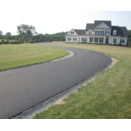With the decline of the Roman Empire, their extensive roadway system fell into disrepair as well. However, many of these roads survive to this day thanks to the superior quality and structure of their pavements.
One of the fathers of modern pavements was Thomas Telford, a Scottish building mason. His engineering techniques and designs for road construction eventually became the norm and form the basis for modern roads today.
By properly maintaining your asphalt, you can avoid major problems down the road. Not only will it extend the life of the surface, but you can eliminate weed growth, stop water from getting under the paved surface, and prevent damaging freezes.
During World War II, asphalt technology was improved in part as a response to the need for durable landing surfaces for heavy military aircraft.
Reclaimed asphalt pavement is material that has been removed from a road or highway and crushed for reuse or recycling into new pavements.
The ancient Mesopotamians used asphalt tar to waterproof temple baths and water tanks. The Phoenicians caulked the seams of their merchant ships with asphalt. In the days of the Pharaohs, Egyptians used the material as mortar for rocks, laid along the Nile to prevent erosion.


